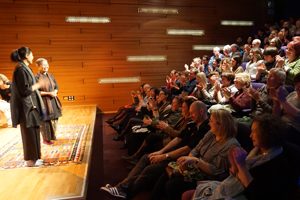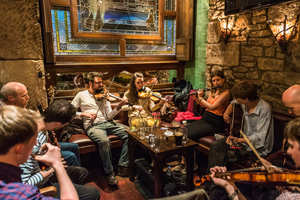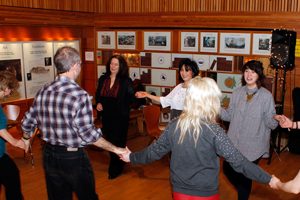SongRoots: Are we passing on songs to the next generation?
The act of passing on songs through an oral tradition, has until recent times, been a large part of Scottish culture. Rhymes and songs have been passed from generation to generation within families and communities. We know that singing and specifically singing to children is educational and healthy for the mind and body; however, I have found that many people today are not singing, and notably, are not singing to children. Some do not want to sing but many just do not know what songs to sing or struggle to remember the songs from their own childhood.
Guest blog by Robyn Stapleton
 The act of passing on songs through an oral tradition, has until recent times, been a large part of Scottish culture. Rhymes and songs have been passed from generation to generation within families and communities. We know that singing and specifically singing to children is educational and healthy for the mind and body; however, I have found that many people today are not singing, and notably, are not singing to children. Some do not want to sing but many just do not know what songs to sing or struggle to remember the songs from their own childhood.
The act of passing on songs through an oral tradition, has until recent times, been a large part of Scottish culture. Rhymes and songs have been passed from generation to generation within families and communities. We know that singing and specifically singing to children is educational and healthy for the mind and body; however, I have found that many people today are not singing, and notably, are not singing to children. Some do not want to sing but many just do not know what songs to sing or struggle to remember the songs from their own childhood.
Last year, I decided to set up SongRoots: a project that will encourage intergenerational singing within families and communities. I was fortunate to receive funding from the Holywood Trust and earlier this year I began working on the project in my local area of Wigtownshire.
Each community has its own history, identity and dialect, which is reflected and can be expressed through the songs of the area. An important aim of the project was to discover the songs that were once part of a local aural tradition, providing the younger generations with a repertoire of songs relevant to their own community.
I am currently in the first stage of the project, which is to collect music and song from the older people in the area. At first, I visited care homes and day centres and spoke to people about their own musical memories. I wanted to discover the songs sung in their early life, the songs sung to children and the songs that they themselves sang to their own family. It was wonderful to see how much people enjoyed sharing their musical memories and reminiscing about a time when singing featured so much in day-to-day life. People spoke to me about a wide range of songs: traditional and contemporary, Scottish, American, war songs, songs from movies, songs from Operas… I decided that I was not going to exclude any musical genre and collect all songs that were relevant to the community or had been commonly sung in the area.
I felt it was important and useful to reach people who lived in the more isolated areas of rural Wigtownshire and I am currently travelling to people’s homes on the farms and in villages near to Stranraer. In this environment, people seem to find it much easier to speak freely and to sing. I’ve also found that the people who were brought up on a farm tend to have had more music in their lives than people brought up in the town, and I’m interested in finding out more about why this is.
I think the most valuable part of my fieldwork has been finding out about the context in which these songs have been sung because, as well as knowing what to sing, it’s also important to seehow people can bring singing and music into their day-to-day lives. Songs for the bath, for games, for sleep-time, house ceilidhs, journeys…
 To help pass on the songs and to encourage singing amongst the younger generations, I have been teaching songs (through adult workshops and to children in schools), performing the songs (at local events and on television and radio), making recordings of the songs (my own performance and during fieldwork interviews) and building a website (so that the songs can be easily accessed and shared).
To help pass on the songs and to encourage singing amongst the younger generations, I have been teaching songs (through adult workshops and to children in schools), performing the songs (at local events and on television and radio), making recordings of the songs (my own performance and during fieldwork interviews) and building a website (so that the songs can be easily accessed and shared).
In October, I performed a SongRoots concert at the Wigtown Book Festival. I was so excited to share the wonderful songs that I had learned from people in Wigtownshire. Some of the songs were not originally from the area, but they were all songs that had long been popular and commonly sung there. The reaction from the audience was fantastic and I was very surprised to see just how much the songs connected with the audience. The songs, referring to local places and people, seemed to connect with the audience on a deeper level than I had experienced before. For some people it was an emotional experience to hear their home celebrated in song for the first time. One person described to me the sense of pride and belonging that they felt at hearing the songs of their own community. It was also great to hear a room full of people singing in their own accent and dialect, and I was delighted at the level of audience participation in the room, particularly amongst the older generation.
My hopes for the future of the project are to continue discovering, and building a repertoire of local songs, sharing them with the Wigtownshire community and beyond, encouraging and facilitating singing within families and communities and creating a valuable musical resource.
As an inter-generational project, I’m looking forward to bringing the different age groups together to celebrate the local songs. It would be wonderful for the younger people involved in the project to have the opportunity to meet those who contributed the songs, and for the older people to experience hearing the songs sung in the community once again.
Robyn Stapleton is a Scots singer and the current BBC Scotland Young Traditional Musician of the Year.







